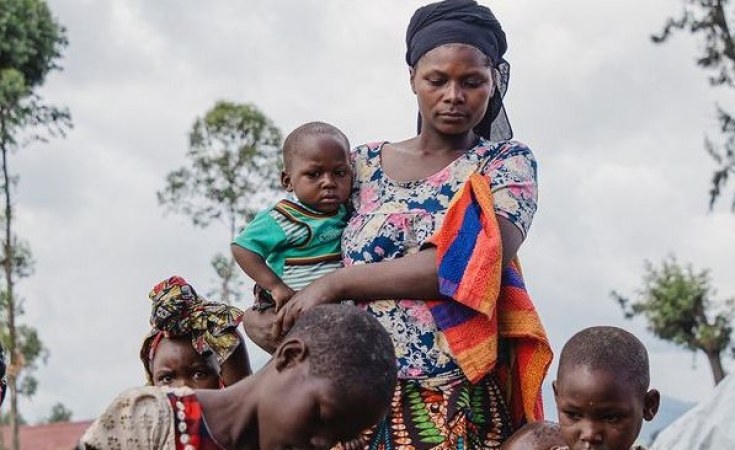Fighting between M23 rebels and government forces has intensified in the Democratic Republic of Congo's North Kivu province. Hospitals and sites for internally displaced persons in the region are overloaded.
The Democratic Republic of Congo's (DRC) eastern city of Goma is struggling to deal with an influx of internally displaced people (IDPs) from the territories of Masisi, Rutshuru and Nyiragongo in North Kivu province, where M23 rebels control swathes of land.
Clashes between the M23 rebels and government forces has been intensifying in Sake, which is a strategic town on the road to Goma and a flashpoint in the latest fighting.
Tensions flared in March 2022 when the rebels, after a decade of relative calm, attacked Congolese army positions near the border between Uganda and Rwanda, causing locals to flee for their safety.
But M23 has indicated in recent statements that it is in the midst of a new advance in eastern Congo, leading to fears the group is again eyeing Goma, which it once seized 10 years ago.
'Women separated from their children'
Congo, the United Nations (UN) and Western countries accuse Rwanda of supporting the M23 rebels in a bid to control the region's vast mineral resources, an allegation Kigali has repeatedly denied.
The Norwegian Refugee Council (NRC), an independent humanitarian organization that helps people who are forced to flee, on Thursday warned that the increased violence had directly affected civilians, with heavy artillery and mortar fire hitting settlements and densely populated areas, including Goma's outskirts.
The UN Security Council on Monday voiced concern at "escalating violence" in eastern DRC that has already displaced 6.9 million people.
"We saw women arriving in Goma from Sake and Masisi in panic because, in the chaos of fleeing, they had become separated from their children," said David Munkle from the World Vision aid group.
"They told us that they had fled their homes without taking anything because shells were hitting their homes, killing and injuring civilians."
Kasiwa Hassan, a resident of Goma, is currently hosting families that fled the fighting in Sake. He and his daughter, Nayla Kasiwa, say they are taking care of those who need, particularly the children.
"In total, we are hosting 30 people from six families that have been displaced by the fighting in Sake," Nayla told DW. "Many of the children are still tired because they walked long distances to reach here."
"Some are sick and we have to find the medication," Nayla added. "Besides, we are struggling to provide enough sleeping space for each one."
'No time to pack'
When the fighting broke out in Sake, Alima Aamili, a mother of five, didn't find time to pack enough clothing for her family. "We didn't expect the war to reach our village. We were surprised and didn't have time to pack some clothing," Aamili told DW's Zanem Zaity in Goma.
"What you see me wearing is all that I have," she added, explaining that whenever she took a shower she had to wash her clothes as well and wait for them to dry.
Nenette Lumoo, another IDP from Sake, told DW that escaping was not easy.
"I tied my children on my loincloth so that I would not lose them along the way until we reached Goma. In this volcanic town, there aren't many fields for us to grow crops," Lumoo said. "We live only by the grace of God."
Since the influx of IDPs to Goma, volunteers at Goma Actif, an independent, non-profit citizens' initiative, have stepped up efforts to try and find assistance for those in need while they wait for the intervention of humanitarian organizations.
Augustin Mosange, from Goma Actif, said the massive increase of IDPs in Goma calls for more support from international organizations since local NGOs have limited resources.
"We try to feed the displaced people with the little we have -- like preparing hot meals whenever they are available," said Mosange. "In the morning we prepare porridge for the children and also distribute some clothes."
Fighting puts Goma at risk
The Norwegian Refugee Council said immediate action must be taken to address the escalating humanitarian crisis in eastern Congo before the situation worsens.
"The safety of civilians must be paramount. All parties to the conflict must uphold their obligations under international law to protect civilians from harm," said Eric Batonon, NRC's Congo director, in a statement.
"This includes ending attacks on civilians and ensuring unhindered access to humanitarian assistance."
A flurry of diplomatic efforts to halt the fighting has so far failed to find a lasting solution.
Zanem Zaity in Goma contributed to this report.
Edited by: Keith Walker


